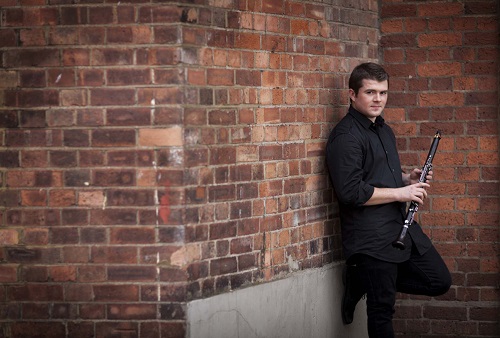 United States Bologne, Cimarosa, Mysliveček, W.A. Mozart, Leopold Mozart, Salieri: Julian Bliss (clarinet), Cincinnati Chamber Orchestra / Eckart Preu (conductor), SCPA Corbett Theater, Cincinnati, OH. 24.8.2019. (RDA)
United States Bologne, Cimarosa, Mysliveček, W.A. Mozart, Leopold Mozart, Salieri: Julian Bliss (clarinet), Cincinnati Chamber Orchestra / Eckart Preu (conductor), SCPA Corbett Theater, Cincinnati, OH. 24.8.2019. (RDA)

Joseph Bologne – Overture, L’amant anonyme
Domenico Cimarosa – Overture, Il matrimonio segreto
Josef Mysliveček – Overture No.2 in A major
W.A. Mozart – Clarinet Concerto in A Major K622; Symphony No.39 in E-flat Major K543
Leopold Mozart – ‘Peasant Wedding’ from Sinfonia for Bagpipe and Hurdy Gurdy
Antonio Salieri – Overture, Cublai, gran kan de’ tartari
The Cincinnati Chamber Orchestra successfully brought its 2020 Summermusik to a close with an all 18th-century evening, highlighted by clarinetist Julian Bliss in Mozart’s Clarinet Concerto in A Major.
All of the unpredictable six selections offered were imaginatively programmed by conductor Eckart Preu, celebrating both his birthday and his third Summermusik at the helm of the increasingly agile Cincinnati Chamber Orchestra.
Guadalupe-born Joseph Bologne was the first mixed-race composer to attain fame and fortune in 18th-century Europe. Here, the inclusion of the elegantly wrought overture to his opera, L’amant anonyme, gave a taste of this largely neglected talent. And another overture followed, Domenico Cimarosa’s more familiar Il matrimonio segreto, which reminded all of the exuberantly colorful writing of this Italian master. Yet another rarity followed — albeit with little impact on most in the audience — the Overture No.2 in A major by Josef Mysliveček, one of Mozart’s Czech contemporaries.
British clarinetist Julian Bliss was the soloist in the Mozart, with a custom-designed instrument. In the concerto’s three movements, he displayed ease in the quick passagework of the Allegro, and seamless legato in the Adagio — including a lovingly executed cadenza, and virtuosic agility and evenness of tone throughout his instrument’s extended range. Most remarkably, Bliss never brought attention to the technical hurdles of the final Rondo-Allegro, concentrating instead on the emotional content of one of Mozart’s most beautiful compositions.
After intermission and after a surprise ‘Happy Birthday’ — sung and played for Eckart Preu by the musicians and the audience — came ‘Peasant Wedding’ from Sinfonia for Bagpipe and Hurdy Gurdy by Leopold Mozart, the dour-looking taskmaster-father. Listening to this work with its bagpipe, whistles, whoops, and percussive effects, one might conclude it was by his younger talented son in one of his ‘wild and crazy’ moods. But no, this was old Leopold in one of his rare moments of levity.
Antonio Salieri’s Cublai, gran kan de’ Tartari is yet another 18th-century opera that has not survived the passage of time. Its overture is typical Salieri: efficiently academic, hardly inspired, and (even though comparisons are odious) wan and wanting in inspiration in the company of Mozart, whose Symphony No.39 closed the evening.
In many of his compositions, Mozart favored the woodwinds, and in the 39th Symphony he wrote terrific lines for the 2/2/2/2 grouping. Among the three dozen brilliant musicians of the Cincinnati Chamber Orchestra, these eight were Rebecca Tryon Andres and Susan Magg (flutes), Chris Philpotts and Mark Ostroich (oboes), John Kurokawa and Miriam Culley (clarinets), and Hugh Michie and Amy Pollard (bassoons), all of whom shone brightly.
Ever attentive to details that could escape lesser, more routine-prone conductors, Preu extracted every bit of melodic invention, every string sforzando entrance, and every hint of syncopation and harmonic daring contained in one of Mozart’s greatest symphonies. It brought the audience to its feet, and made a memorable closing.
Or so we thought. Preu brought back Bliss to have the final word, with a gorgeous arrangement for clarinet and orchestra of Gershwin’s ‘Summertime’, a suitable closing to a superb Summermusik.
Rafael de Acha